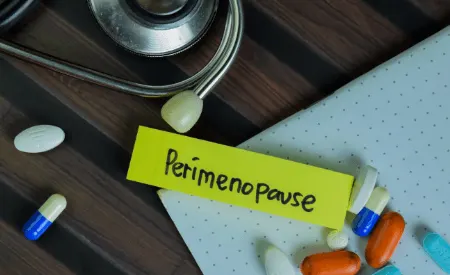Perimenopause: What Is It And How It Affects Your Period?

Experiencing a change in your menstrual cycle? Is it varying in length or there’s an irregularity? Either way, there are chances that perimenopause might be causing it. Perimenopause, also known as menopause transition where your body prepares itself to enter menopause. If you are in your mid 40’s, noticing this change is normal and natural. However, perimenopause symptoms don’t necessarily occur post 40’s, it can happen earlier too.
- What Is Perimenopause?
- How Long Does Perimenopause Last?
- What Are The Signs & Symptoms Of Perimenopause?
- What Happens To Your Periods In Perimenopause?
- Perimenopause and pregnancy
- How Is Perimenopause Diagnosed?
- How Is Perimenopause Treated?
Understanding the perimenopause symptoms and their effect on your periods is quite essential. We at ALWAYS believe that every woman should be well aware of her body. Thus, today we have found out what perimenopause is, its signs and symptoms along with a few perimenopause treatment options. So, keep on reading!
What Is Perimenopause?
Perimenopause is the transitional phase before one enters menopause. In this period, the ovaries tend to reduce their oestrogen production. This affects the length, flow of your cycle and makes it irregular. Typically, perimenopause is considered to be a hallmark of your reproductive days nearing the end.
How Long Does Perimenopause Last?
On average, a woman enters perimenopause as early as the mid-30s to mid-50s. The symptoms of perimenopause tend to last for four years, on average. But as every woman’s body is different, it could last for a few months or even ten years. Once you stop getting your periods for straight twelve months, your perimenopause comes to an end and the next chapter of menopause begins!
Some women may also experience early perimenopause because of certain risk factors such as having a family history with early menopause, smoking or consuming tobacco, having a history of cancer treatment, or having undergone a procedure for the removal of reproductive organs like uterus or ovaries.
What Are The Signs & Symptoms Of Perimenopause?
Apart from irregular periods or changes in the bleeding patterns, here are a few additional perimenopause symptoms to watch out for:
1. Night sweats
2. Hot flashes
3. Vaginal dryness
4. Difficulty in remembering
5. Change in libido
6. Difficulty in urinating

What Happens To Your Periods In Perimenopause?
In perimenopause your hormonal levels, responsible for your monthly menses, tend to fluctuate immensely. This in turn results in different changes in your otherwise regular periods. As every body is different, these changes also tend to differ. Let’s see in what way does perimenopause alter your cycle.
1. Heavy bleeding
Bleeding during perimenopause could be relatively heavy. This is the result of fluctuating hormones that build your uterine lining. It makes the lining thicker, causing less frequent yet heavier periods during perimenopause. To understand whether your flow is heavy or not, you would need to answer the following questions:
- Is there a need for double menstrual protection i,e. layering two pads or wearing pads with a tampon?
- Do your tampons or sanitary pads soak up faster than usual?
- Do your periods last more than seven days?
- Is the flow interrupting your day-to-day tasks?
If the answer is yes, then heavy perimenopausal bleeding has begun. In such situations, using the best menstrual protection is a must. Try out the ALWAYS Maxi Thick Pads that have unique leakage barriers and an extra absorbent core that provides maximum coverage and minimises the risk of leakage. It also has high Flexi wings that keep your pad in place.
If you are tampon user, the ALWAYS Tampax Cardboard Tampons are a great option. These are designed with an innovative absorbent core and a protective skirt which keeps leakage at bay. It’s anti-slip grip applicator ensures a stress-free insertion.
Additionally, this type of bleeding during perimenopausal can lead to fatigue, cramps and other conditions like anaemia. The best way to deal with it is to consult with a doctor.
2. Spotting between periods
Perimenopausal spotting is caused due to hormonal imbalance or build-up of the uterine lining. It can occur before or after the period ends. Spotting during perimenopausal is usually a few amounts of brownish blood that can be taken care of by the use of panty liners. Try out the ALWAYS Multiform Protect Panty Liners which are extra thin (1mm) and have a fresh scent to them. These liners are dermatologically tested and safe for your skin.
In case you notice some blood every two weeks, it’s best to visit a doctor. Here, keeping a track of your period can be quite helpful. As it will enable your doctor with a better diagnosis.
3. Shorter cycles
As mentioned earlier, during perimenopause your oestrogen levels tend to dip. This leads to a thinner uterine lining, thereby causing you to bleed less. In such situations, your perimenopause period would be 2two or three days shorter than usual. This tends to happen in the early stages of perimenopause.
In such cases, it’s important to keep your go-to sanitary pads or tampons handy.
4. Longer cycles
As your perimenopause progresses, you start experiencing fewer periods and longer cycles. These cycles are longer than 38 days and occur in the later stages of perimenopause.
5. Missed periods
Missed periods during perimenopause occur due to hormonal fluctuation. There would be instances where you wouldn’t even remember your last cycle cause it’d be that long ago! Point to note that once you go without periods for straight 12 months, it’s an indication that your menopause is here.
As the missed period is an early pregnancy sign, it's best to take a pregnancy test. This can help you differentiate between pregnancy and perimenopause symptoms. Another way around it is to speak to your doctor. He can run a few tests and give you a clear conclusion. In a few cases, one of the causes of irregular periods could be underlying conditions like endometrial atrophy, uterine polyps or uterine cancer. Thus, it’s advised to visit a doctor as soon as you spot irregularity in your cycle.
Additionally, one might also notice a thin and watery discharge or clumpy and thick discharge. If this type of discharge comes with itching, it’s best to get it checked for any infections.
Perimenopause and pregnancy
Many women have concerns about conceiving during perimenopause. Well, the good news it's possible to pregnant in this stage. Even though your body has lower the hormonal production, it's still going to make you ovulate. Given that the hormones keep fluctuating, it might be a little difficult to conceive than usual. If you are planning to conceive, consulting a doctor is the best option.
How Is Perimenopause Diagnosed?
The diagnosis is done based on your perimenopause symptoms. Your doctor might take a blood test to check your hormone levels. But as these levels keep fluctuating through the perimenopause period, it’s best to do more blood tests through different months.
How Is Perimenopause Treated?
There’s no perimenopause treatment because it isn’t a disease. However, you can try a few natural remedies for perimenopause to ease the symptoms. They are as follows:
1. Exercise:
This can help you ease bloating and cramps experienced during periods.2. Meditation:
It can lower your stress levels and help your perimenopause symptoms like difficulty in sleeping.3. Heat pack:
Another solution for your cramps is applying a heating pad to the affected area.4. A balanced diet:
Your perimenopause diet should have foods rich in vitamin D and C to avoid osteoporosis. Likewise, consuming dairy products and green leafy vegetables is a must.5. Hydration:
Having plenty of water can help you fight dehydration and perimenopause symptoms like vaginal dryness.Wondering why your period stops then starts again next day? Our guide explains common reasons for this cycle pattern and how to manage it.

When To Visit A Doctor
You should contact a doctor immediately in the following scenarios:
1. Periods with heavy bleeding
2. Periods that go on more than seven days
3. Bleeding that happens more frequently than three weeks
4. Bleeding or pain after intercourse
5. Bleeding after one year without a period
Takeaway
As your body is transitioning, you might find it a little difficult to deal with the changes. Talking to your doctor and discussing your perimenopause symptoms can help you ease your concerns. The medical talk might also prepare you for what’s coming next - menopause!
Read more about period symptoms and what causes period pains.
Stay well prepared for your next period by tracking it on Always Period Calculator.
FAQs
1. Can I get pregnant if I am in perimenopause?
Yes, it could be a little difficult to conceive. But as long as you get your periods, it’s possible to get pregnant during perimenopause. You can talk to your doctor and figure out if there are any possible fertility problems.
2. What can cause early perimenopause?
The following factors can lead to early perimenopause:
Family history with early menopause
Smoking or consumption of tobacco
History of cancer treatment
Removal of reproductive organs like uterus or ovaries
3. Does perimenopause affect my sleep?
Yes, difficulty in sleeping is one of the many perimenopause symptoms that affect women. Meditating is a good option to relieve stress and have sound sleep.
Disclaimer:
Please note the date of last review or update on all articles. No content on this site, regardless of date, should ever be used as a substitute for direct medical advice, diagnosis or treatment from your doctor or other qualified clinician. Always is committed to ensuring that all of our products meet rigorous safety standards; Always pads prioritize safety, protection and comfort of its consumers.




